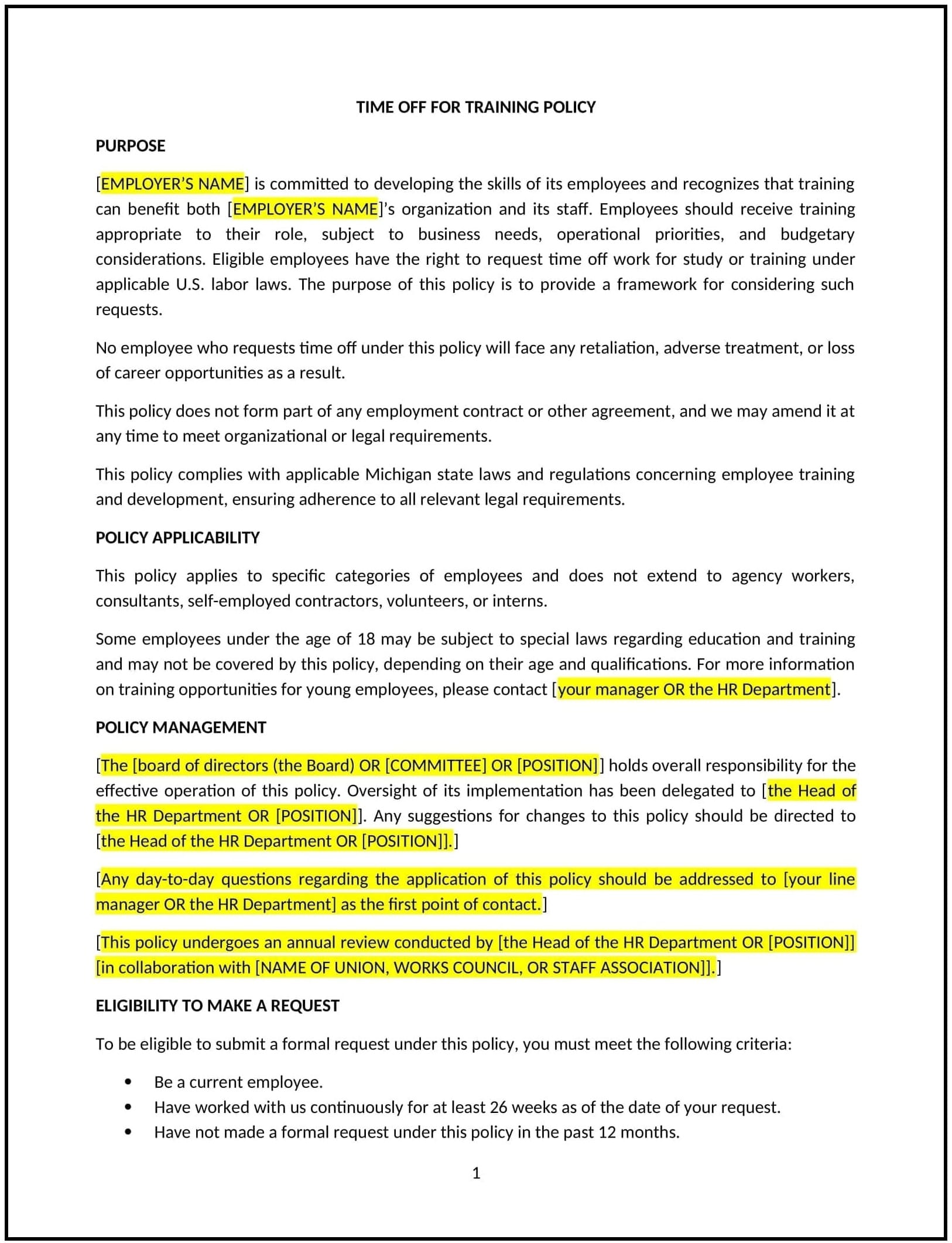Time off for training policies (Michigan): Free template
Got contracts to review? While you're here for policies, let Cobrief make contract review effortless—start your free review now.

Customize this template for free
Time off for training policy (Michigan)
A time off for training policy outlines the guidelines for Michigan businesses regarding employee requests for time off to attend training programs, workshops, or courses that support their professional development. This policy ensures that employees can enhance their skills while maintaining the operational needs of the business. It includes procedures for requesting time off, eligibility criteria, and the business’s approach to managing time away from work for training purposes.
By implementing this policy, businesses can foster a culture of continuous learning, improve employee performance, and align training opportunities with the organization’s goals and objectives.
How to use this time off for training policy (Michigan)
- Define eligible training opportunities: Clearly outline which types of training qualify for time off, such as professional development courses, certifications, workshops, or industry-related conferences. Specify whether the training must be directly related to the employee’s current role or if broader development is allowed.
- Set eligibility criteria: Specify the criteria for employees to be eligible for time off to attend training, such as the length of employment or the relevance of the training to their job duties.
- Outline the process for requesting time off: Establish how employees should request time off for training, including the required notice period, any necessary documentation (e.g., course enrollment confirmation), and how to submit the request for approval.
- Determine compensation for time off: Clarify whether employees will receive paid time off for training or if the time will be unpaid. Some businesses may allow employees to use PTO, vacation days, or offer paid training leave.
- Address scheduling and coverage: Ensure that employees’ time away from work for training does not disrupt business operations. The policy should outline how work will be managed in the employee’s absence, such as delegating tasks to colleagues or adjusting schedules.
- Consider employee return on investment (ROI): Specify that businesses may require employees to apply new skills or knowledge to their roles after completing training. This could include providing feedback or sharing insights from the training with the team.
- Review and update regularly: Periodically review and update the policy to ensure it reflects changes in business needs, industry standards, or Michigan state regulations, ensuring that the policy continues to support both employee development and business objectives.
Benefits of using this time off for training policy (Michigan)
This policy provides several key benefits for Michigan businesses:
- Fosters professional growth: By offering time off for training, businesses encourage employees to develop their skills and stay current with industry trends, ultimately benefiting the company with a more knowledgeable workforce.
- Improves employee performance: Employees who receive relevant training are better equipped to perform their job duties effectively, leading to improved productivity and quality of work.
- Enhances employee satisfaction and retention: Offering opportunities for professional development can increase job satisfaction, employee morale, and retention rates by showing that the business values employees’ growth and success.
- Increases business competitiveness: A well-trained workforce can help the business stay competitive in the marketplace by fostering innovation, improving efficiency, and meeting evolving industry standards.
- Supports business objectives: By aligning training with business goals, businesses can ensure that employees’ development contributes directly to achieving organizational objectives, improving performance, and driving growth.
- Ensures legal compliance: The policy ensures that the business complies with any relevant Michigan state labor laws and regulations related to employee training, leave, or compensation for training time.
Tips for using this time off for training policy (Michigan)
- Communicate the policy clearly: Ensure all employees are aware of the time off for training policy by including it in the employee handbook, during onboarding, and in regular updates about professional development opportunities.
- Make the request process easy: Simplify the process for requesting time off for training by providing clear instructions and the required forms or documentation.
- Ensure fairness in approvals: Establish a fair and transparent process for approving time off for training. Ensure that employees have equal access to training opportunities and that approvals are based on relevance to their role and the business’s needs.
- Provide support for employees attending training: Offer logistical or financial support for employees attending training, such as funding for training programs, transportation, or accommodation. This helps ensure employees can take full advantage of training opportunities.
- Monitor the effectiveness of training: Evaluate the impact of training on employee performance, and assess whether the skills gained from training are being applied effectively in their roles. Collect feedback from employees to identify areas for improvement.
- Review the policy regularly: Periodically assess the policy to ensure it remains relevant to the business’s objectives and compliant with Michigan state laws. Adjust the policy based on feedback from employees or changing business needs.